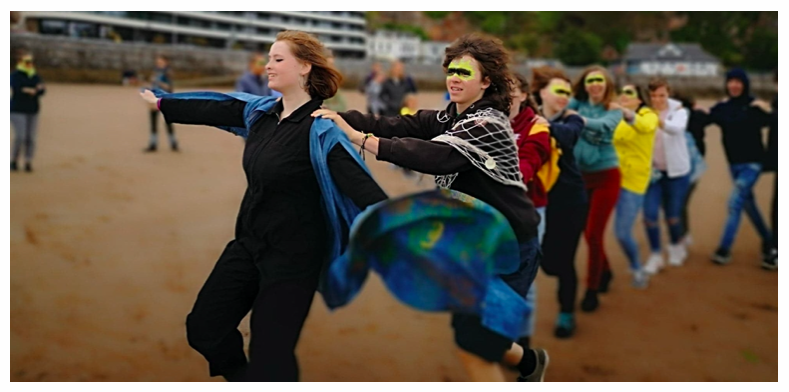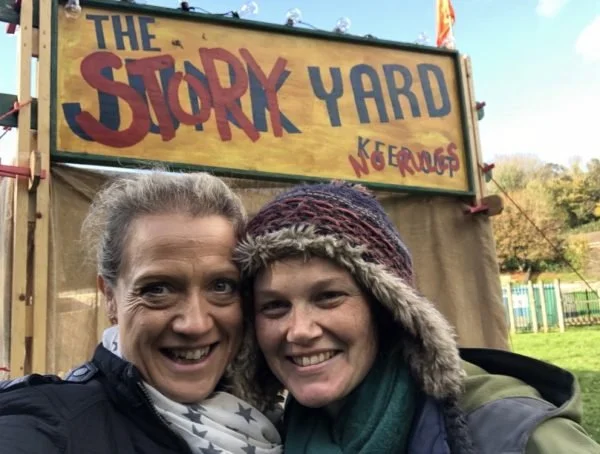Save The Arts, by Erin Walcon, July 2020
We worked with Erin and the team at Doorstep Arts in Torbay for seven years as part of the Collaborative Touring Network. We’ve learned so much and been frequently inspired by the rigour and beauty of Doorstep’s work, as well as always loved to visit Torbay. This message feel like a really important part of the conversation happening in the world today, strong ethos built with masses of tried and tested experience. Have a read and please share further.
#SaveTheArts: let’s talk about it, reposted from Doorstep Arts of which Erin is Co-Director; see the original post from 8 July 2020 at https://doorsteparts.co.uk
“I’ve seen the hashtag #SavetheArts circulating a lot on social media this week and I’ve also seen some brave calls-to-action from those who feel that the arts need to change. I agree with much of what David Jubb and Byron Vincent have said – and I appreciate the candor and courage it takes to be honest to a sector which we love and which is in deep turmoil right now. In this moment of disruption, we have an opportunity and the responsibility to let that go which is no longer serving us – especially when it isn’t serving all of us. But I also think it’s important to name the good work that has been going on, quietly, tirelessly, and often without public recognition. There are some part of the arts that I deeply and passionately believe are worth saving. It’s just much of that work doesn’t get on the news.
I teach Applied Theatre at the University of Exeter. My Applied theatre students do residencies in schools, in childrens’ wards of hospitals, in Pupil Referral Units, in dementia care facilities, work with adults with learning disabilities. Their job is to work responsively and provide what that community or site needs – often it is laughter, or joy, or play or a space to feel connected to other people. I also co-run Doorstep Arts in Torbay, alongside a team of part-time, freelance staff. I care for my own two young children in, around, underneath, and throughout this work. The work that I do, both at the university and via Doorstep – it’s about social change. We believe that if you want to change the world, and make it better and more fair, that the best and only way to do this is to focus on the children. That’s where social change and social justice can most meaningfully happen.
Doorstep is a small arts organisation and we are based in an area of high deprivation – Torbay tops the national ranking for deprivation vulnerability post-Covid, so this work just got harder and more important. This work was already precarious – it just got more so. For many of the families we work with, their access to food and housing is now even more uncertain than before.
We run drama groups – 14 of them. Across Torbay, for children and young people, located in accessible and safe community spaces like church halls and youth clubs. That work sounds like a small thing when you’re talking about people struggling to make rent and feed their families, but I would argue that it’s the most important thing we can do. In order to explain to you why, I would need to take you by the hand (haha, can’t, social distancing) and lead you into a room full of 7 year olds, stood with their feet planted firmly, confidently raising their chins, feeling a part of something important. Feeling that they matter, and that they have power and that their voices have power to change things.
In working with the children of this community, day in and day out, we create opportunities for children to tell their stories, to try out their voices, to experiment with different identities within safe spaces, and to make beautiful community moments happen where they get clapped and applauded for being brave and strong. This work is about long-term change. We build trust. Families stick with us. The stories they tell – the plays they make up, the songs they sing, the poems they write, the drawings they do – are all about diversity and strength, because that art is all about them. In the process, we have big complex conversations with them about justice, about equity, about hope – they are smart. They teach us back. These young people deserve to have access to spaces where they can feel safe, powerful, and valued. These spaces are precious in Torbay.
We run a lean grassroots operation, across 5 strands of work. Most of our funding goes directly into live delivery. We intentionally keep ourselves lean, agile, and responsive, so we can react to what our community needs. Everyone in our team is part-time and freelance. When Covid hit, we were able to almost immediately repurpose our budgets and work to support local freelancers. We have sustained our work throughout the last 14 weeks of lockdown, continuing to provide support for schools, our local freelance community, our families. We have delivered cabbage plants to people’s doorsteps and read stories to children over Zoom. We have danced and asked others to join us. We have checked in, again and again, on people that we care about, here in our community. We have created resource packs and coordinated responses with other small organisations. These things are not rocket science. They are our basic and essential duty of care. They are our human responsibility to our community. We have worked every day through this crisis. Not a single member of our team has taken a day off.
So… here’s the tricky bit. The big buildings and big venues of the UK are in serious trouble and it’s going to take serious money to help ‘rescue’ them. And this is a really uncomfortable conversation to be having because we love these venues and our arts and cultural sector is amazing and important.
But I’m worried if we keep focusing the conversation on the buildings that ‘need saving’ we’ll forget that it is often the leanest and smallest and most responsive work that can do the most good right now. My life work is not arts as ‘entertainment’ – it is arts as an act of service, of help, of social justice, of change. Direct action is key, and the arts in the service of children in areas of complex deprivation is key work right now. The work that Doorstep does, it takes place in lots of unusual venues. Yes, sometimes theatres – we love our local theatres and we will fight for them to survive this crisis. But also libraries, community centres, parks, in the streets, in derelict shops. Schools.
My personal passion area is schools – they hold enormous potential for meaningful change. Participatory arts, embedded in schools, is front-line support right now for students and it has a vital role to play in supporting the next phase of recovery. Teaching Artists and participatory workers are essential keyworkers in helping children and young people to re-adjust and re-build social bonds and ensure that they can navigate a return to formal education in a healthy and resilient way. Teaching Artists and participatory workers can facilitate children and young people’s re-engagement in learning, using play and embodied approaches, supporting positive mental health through trauma-informed creative practices, reducing isolation, and providing necessary spaces and structures to make meaning of the Covid 19 experience. We are in regular contact with the 150 children and young people we work with every week and we’ve seen first-hand how Covid has impacted them. This next stage of work facilitating the emotional, mental and personal needs of children is just as important as the work of managing the physical pandemic.
Doorstep has written a Manifesto for Change (pasted below) for the arts sector – please have a look and share it if you feel the same way. And if you feel differently, let’s have a respectful and full conversation about it. We need dialogue right now – not social media ‘comments’ dialogue, but real conversations about the way forward. We need to listen to each other. We worked on this manifesto in partnership with our friends at Beyond Face, and we are hosting an online conversation with David Jubb on Thursday 23 July, via Zoom. Come join us? I want to have this conversation – I want to embrace the healthy friction which this moment has brought us.
Please come join. All welcome. Let’s find our way forward by walking where we need to go. With love, Erin ”
image description: a line of people in various bright outfits dancing proudly along a beach, most have black and yellow make up across their eyes and their hands on the shoulders of the person in front (Screenshot from Doorstep Arts website, no photo credit)
Doorstep Arts’ Manifesto for Change
Across the UK, participatory arts organisations are working deeply embedded in their communities. This is long-term, rooted and socially relevant work. Sitting within (not alongside) our local communities, we have a vital role to play in supporting recovery from Covid-19.
This is not Arts as entertainment or luxury. This is Arts as a tool: for wellness, empathy, communication, for imagining and manifesting the future we want to live in. The Arts are necessary agents for change. They are integral to communities, inherently collective, potentially transformative. Now is not the time to return to ‘business as usual’. There is an opportunity now for a hopeful revolution of our creative industries – working from the margins inward, not from the centre outward. Listening, responding and acting in unison with what our communities voice and need.
As our economic, social and cultural models shift, we must imagine fiercely, drawing on alternative ways of working that can bring real benefit and hope to our communities. In this new landscape, participatory arts must be viewed as Key Work.
We advocate for:
Investment in grassroots & socially-engaged creative infrastructure
Covid-19 recovery must escalate ambitions to build a more resilient, diverse, democratic and relevant cultural sector. Grassroots organisations have shown themselves to be highly agile over the crisis period. Already rooted in communities, they have been able to respond and adapt quickly, from a position of deep local knowledge and trusted networks. The demand for a sudden change has been a wake-up call for our sector. As a result, diverse-led organisations have been called upon for their knowledge and expertise – this needs to be recognised with investment.
A re-imagining of touring theatre and performance platforms
Facing a difficult new reality for many of our theatre buildings, the value and potential of non-traditional venues needs to be recognised. Parks and green spaces, community halls, libraries and schools are part of our everyday. These can provide trusted entry-points for communities and help to redefine the relationship between audiences and performers.
Investment & advocacy for the role of the arts in public health
We face an epidemic of mental health concerns, in particular amongst young people who have lost many of their social coping structures and Black, Asian & ethnically diverse communities who have been disproportionately affected. This is as urgent as the physical pandemic itself. Participatory arts can bring transformative outcomes for health and wellbeing. The Arts need to be part of public health planning and delivery, supporting recovery in communities.
Changing the narrative
The codes of the cultural sector need to be punctured and redefined. Now we have the opportunity to reframe the cultural narratives we are used to. We must ensure that there is a representation of diverse voices across every platform; from leadership positions, to pathways into opportunities for artists and young people. Long-term change means embedding thinking across every aspect of our cultural sector, to ensure authenticity and renounce tokenism.
A commitment to equity of opportunity and experience
Covid-19 has amplified economic, emotional and health challenges faced by disadvantaged communities. Systematic privileges and deep-rooted inequalities in our society cannot continue to be ignored. We must turn to those already rooted in communities of need and ‘cultural cold spots’, working across sectors to create opportunities to be heard, to learn, to work, to experience a quality of life. Their expertise and voices need to be amplified into, and for the benefit of, our wider arts ecology.
Environmentally-responsible and inclusive economic recovery
We have seen how society can shift behaviour in a time of great need. We now have a choice to commit to a recovery that is both sustainable and equitable, embracing an intersectional approach, ensuring multiple narratives are heard. To meaningfully address Climate Change, we must imagine and establish new norms, create green jobs, change how cultural businesses operate, how we travel, live, create and share work. This will take brave, visionary leadership. It is both urgent and possible now.
Written by: Doorstep Arts and Beyond Face
Join in the discussion
We’re hosting an online conversation with David Jubb, former Artistic Director and Chief Executive at Battersea Arts Centre on July 23rd at 1.30pm. Join in the discussion as we attempt to re-imagine a cultural sector with community at its heart. https://doorsteparts.co.uk/whats-on/davidjubb
image description: Erin with Luxi’s Caroline smiling, Erin on the right in a fluffy hat and green scarf, Caroline with hair tied back, a black coat and white scarf; in front of big hand painted sign saying “The Story Yard”


